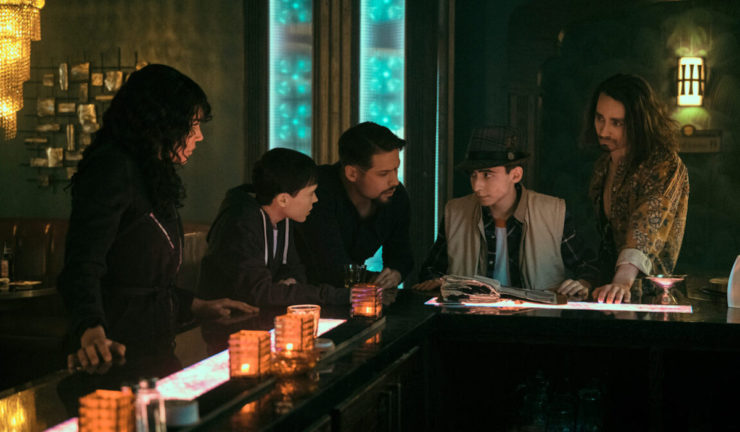The second season of The Umbrella Academy ended with a nasty cliffhanger, as the Hargreeves kids came forward in time from 1963 after saving the world from nuclear armageddon only to find that the Umbrella Academy doesn’t exist, and in its place is the Sparrow Academy, still run by Sir Reginald Hargreeves (played by Colm Feore, the character now alive in 2019) but with six new children as his students, plus the also-still-alive Ben.
What follows is a worthy third season that keeps the themes of TUA from prior seasons while giving us some new stuff.
SPOILERS FOR ALL TEN EPISODES OF THE UMBRELLA ACADEMY SEASON THREE FOLLOW…
In the very first episode, we get a dance-off between the six surviving Umbrella students and the seven Sparrow students to the tune of “Footloose,” which serves as a lovely reminder that we’re watching The Umbrella Academy. The whole thing is completely batshit, and sets the tone perfectly.
Sadly, the dance-off isn’t real: it’s a hallucination suffered by Diego (David Castañeda) induced by the blackened spit of one of the Sparrows, Jayme (played with glorious Goth not-giving-a-fuck by Cazzie David). I adore that the big brooding dude is the one whose fondest desire is for a Kenny Loggins-inspired dance-off instead of a superhero battle, and it’s also much more fun than the actual superhero battle that follows.
However, that battle does serve to introduce the Sparrows. We already know Ben (Justin H. Min), though in this timeline he’s kind of an asshole, and we also get Jayme, Alphonso (Jake Epstein, who can redirect blows on himself back at his attacker, a power that is maddeningly inconsistently applied, and which also makes his skin melt over time for some reason), Fei (Britne Oldford, who is blind but can create crows that can see, hear, and act on her behalf), Marcus (Justin Cornwell, as strong as Luther, but also very athletic, and also #1 and so the leader and strategist), Sloane (Genesis Rodriguez, who can manipulate gravity), and Christopher (a big floating cube, whose voice is all trills and clicks and stuff).
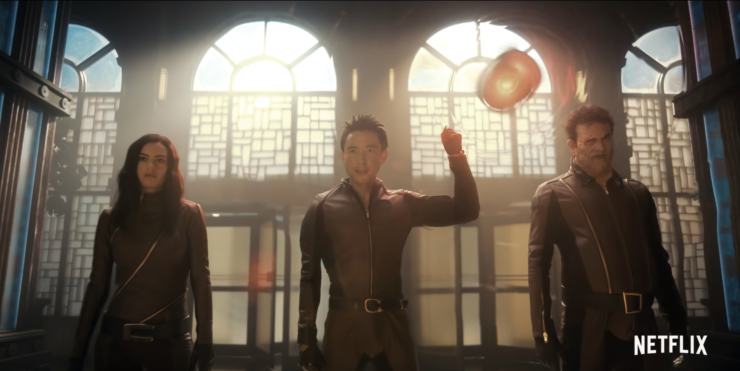
Hargreeves has an explanation for why he’s chosen entirely different students: he met the six Umbrellas in 1963 and thought they were total fuckups (he’s not wrong…) and he didn’t want to make the same mistake twice, so he recruited seven different students. (Well, only six, but Ben was dead by the time the younger Hargreeves met them, so he didn’t know about him.)
This serves to make the cast—which is already almost unmanageably large—bloated as hell, and if you’re a compulsive credits-watcher like me, you already know ahead of time that most of the Sparrows aren’t long for the world, as it were. Only three of the seven are in the main “opening” credits—Min, who’s been there all along, Oldford, and Rodriguez—while the others are listed as guest stars. So it’s not really a surprise that Marcus is taken out of action at the end of the first episode and Jayme and Alphonso are killed at the end of episode three.
At the very least, the cast bloat is better handled this season than it has been in the prior two seasons. The story has the characters going off in different directions for various selfish reasons and not actually communicating with each other. As an example, two Umbrella students spend a lot of time and energy concocting a way to retrieve Five’s time-travel briefcase from what is now the Sparrow Academy, blissfully unaware that Five himself (Aidan Gallagher, taller than before but still convincingly a preadolescent kid in body and even more convincingly a fifty-eight-year-old temporal assassin intellectually), along with Lila (Ritu Arya, loony as ever), already have the briefcase, and are using it to travel to the Temporal Commission.
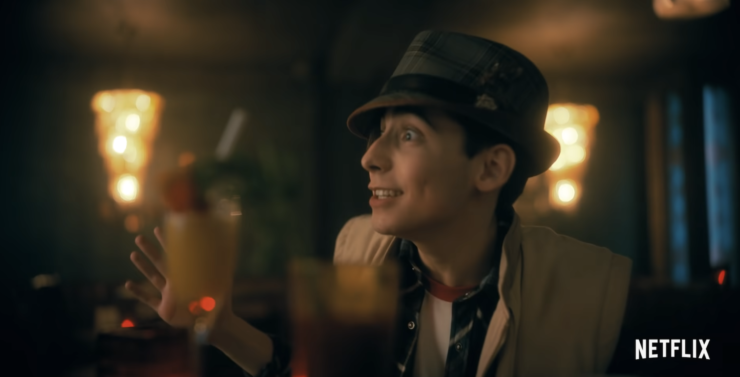
Showrunner Steven Blackman has deviated from the Gerard Way/Gabriel Bá graphic novels in many ways (for one thing, the main characters have codenames as well as numbers in the comics, but those codenames have never been used on TV), but is still using the comics series as a basis. Just as season one adapted Apocalypse Suite combined with elements from Dallas and season two adapted more or less the rest of Dallas, this third season is a mix of Hotel Oblivion and the as-yet-unreleased Sparrow Academy.
One element of the series that was dictated, not by the comics, but by events in real life was handled magnificently, if a little too unconvincingly smoothly: actor Elliot Page transitioned in the interim between seasons, and Blackman beautifully works that transition into the storyline, with Vanya becoming Viktor. Given everything that the character went through in 1963, including being unreservedly loved for the first time ever, it all works. They even have Luther do the whole awkward, “should we do something for him to celebrate this?” with Diego telling him to chill out and just roll with it. Before long, it’s all completely natural, which is as it should be. (Honestly, it’s a little too natural given the contentious relationship among the Hargreeves siblings, but there’s plenty of other family drama to keep them busy…)
The plot is driven by a Kugelblitz—basically a massive ball of energy that’s expanding—that appears in the basement of the Sparrow Academy at the same time that the Umbrella kids came back from 1963. It pulses periodically, and every time it does, people and animals just disappear. It claims Marcus early on, and later it has a massive expansion that swallows Fei and Christopher. It’s the result of the grandfather paradox enabled by the Umbrella students’ time-travel shenanigans—but not a direct result.
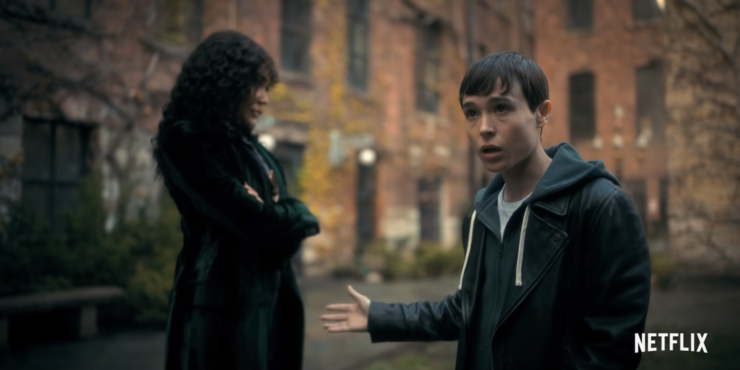
For the first several episodes, we keep getting glances of an older man named Lester Pocket (played by Callum Keith Rennie, thus fulfilling the needs of seemingly every show filmed in Canada that Rennie must show up at some point). It isn’t until the end of episode three that we learn that it’s Harlan, Sissy’s autistic child, who is now an adult who can speak, but still needs soothing sounds to drown out the noise of the world, that last being the only sop to his autism, which was much more severe last season.
Oh, and he’s still super-powerful. He’s tuned in to the Umbrella students, so he’s able to track them once they show up in 2019. Prior to that, he reached out to the six of them on the day his mother died of cancer—which happened to be the 1st of October 1989, the day the 43 kids with powers were spontaneously born. Unfortunately, Harlan’s lashing out killed all six of their mothers before they could give birth—which means that, even if Hargreeves had wanted to recruit the six of them, he couldn’t have. In this timeline, the six of them don’t exist. And yet, there they are: it’s the grandfather paradox, which has the rather unfortunate side effect of destroying the universe.
When kicked out of the Academy, the gang go to the Hotel Obsidian, a formerly swanky joint that has fallen on hard times. It turns out that the hotel—a riff on the Hotel Oblivion from the comics, which was an interdimensional portal that Hargreeves sent all the villains the Umbrella Academy faced to when they were defeated—is owned by Hargreeves. In the TV show, Hargreeves built the hotel on the site in 1918 around an interdimensional portal. On the other side of that portal is the means by which they can reset the universe. Which is necessary, as the universe is being wiped out bit by bit until all that’s left is a tiny crater around the hotel—which somehow maintains Earth-normal gravity and weather, because of course it does.
To no one’s surprise, Hargreeves is pulling strings even though he doesn’t even really know his original students. He’s trying to reset the universe not just to save all of existence, but also to restore the life of his wife, whom we discover in the final episodes has been kept in suspended animation on the moon all this time. Luther’s three years hanging out on the moon was done, not to protect Earth, but to protect her, though Hargreeves never told him or anyone else that.
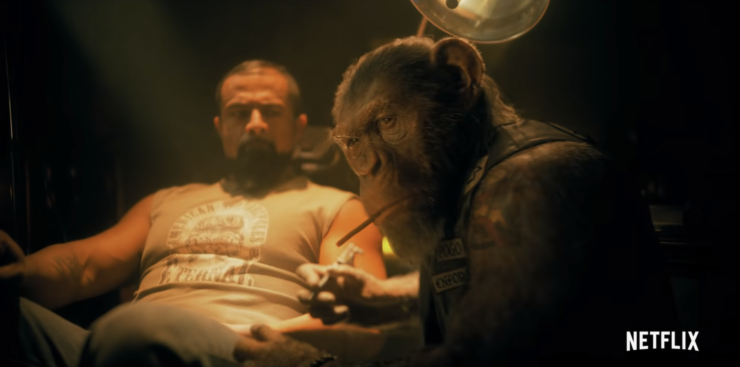
Indeed, that particular endgame is rather unconvincingly shoehorned into the end of the season, and feels like Blackman and his writers were struggling to find the right motivation for Hargreeves (beyond “he’s an asshole”).
But what makes the season fun to watch and an enjoyable look at the insanity of superheroics is the various examinations of the concept of “family” that we see throughout. Hargreeves realizes that his mistake with the Umbrellas was to not let them know the true extent of their powers, though this version of improving his parenting raises him only from being the worst parent ever to merely being an appallingly dreadful one. Issues of sibling love and betrayal and well as the notion of who might be a good parent—seen not only with Hargreeves and his horribleness, but also Allison and her lost daughter (Claire never existed in this timeline) and Diego’s having a son by Lila dropped on him (Javon “Wanna” Walton, doing a wonderful job of playing the world’s most obnoxious twelve-year-old).
Buy the Book
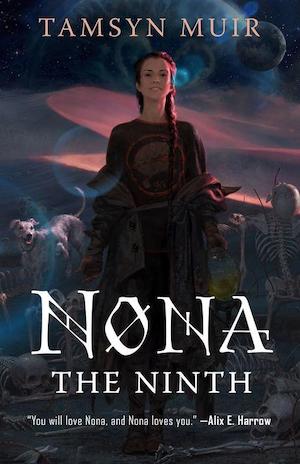

Nona the Ninth
This season also returns to the first-season trope of the early twenty-first century having the technology of the 1980s: no computers (except for the primitive laptop Luther has on the moon), no cell phones, music played on vinyl and cassettes (Harlan has a Sony Walkman and a case full of tapes), and, as a weird add-on, all the American cars have the driver’s side on the right. It’s a weird thing that gives the whole thing a sense of “other,” and a more subdued version of the comics’ full embrace of an alternate pulp reality filled with aliens, talking chimps, robots, and steampunky technology created by Hargreeves (like the “televator”).
The acting remains excellent, with Blackman regularly pairing people off. Tom Hopper does a wonderful job with Luther who has moved past both the trauma of finding out just how useless his devotion was in season one and the giving up on everything in season two, and now just wants to find happiness—which he finds in a relationship with Sloane, the one member of the Sparrow Academy who’s not an awful person. Their romance is a lovely throughline for the series, the closest anyone comes to being happy in the series, and Hopper and Rodriguez play it beautifully. Page and Emmy Raver-Lampman are fantastic as Viktor and Allison, who both lost the most in coming forward from 1963, and who go from closest of the siblings to the ones who most want to rip each others’ faces off, and each emotional shift is utterly convincing. Castañeda and Arya continue their fabulous chemistry from season two, while Min and Oldford make a strong double act as the surviving Sparrows trying to make things work. Robert Sheehan does a wonderful job with Klaus, who learns a lot about how his powers really work thanks to a completely absurd road trip with Hargreeves, in which the sheer lunacy of the situation, which is played hilariously straight by Sheehan and Feore, is ruined mostly by the impossibility. Sorry, but my suspension of disbelief doesn’t extend to dozens of cars hitting Klaus and killing him over and over and just driving on. That doesn’t happen (certainly not with buses, who have to fill out paperwork when that happens), plus not everyone who is hit by a car is killed (quite the opposite, in fact). It’s a goofy slaptstick bit that goes on too long and where it works at all is in the interactions between Sheehan and Feore.
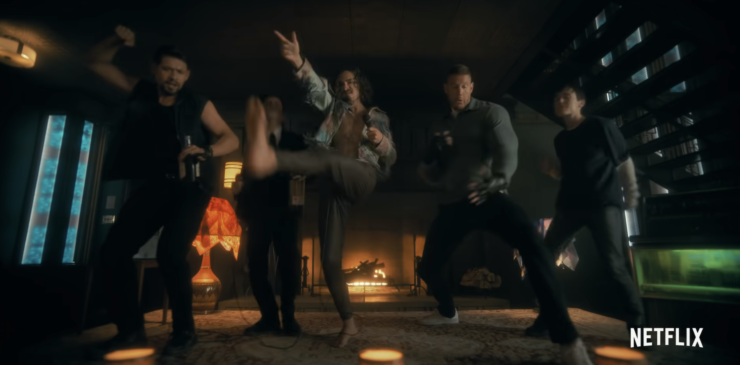
But, as always, the standout performance is by Gallagher. His frustration with the whole thing, with his inability to actually retire like he wants to, with everything he does to save the world only making things worse, and with the fact that he knows more than pretty much everyone, yet they continue to not take him seriously is all perfectly realized by Gallagher, who has simply been giving the performance of a lifetime as Five.
The story doesn’t always hang together, and it’s obvious that they had too many characters even before introducing six new ones. While it’s more a feature than a bug, it’s still frustrating that, after all this time, the Umbrellas don’t friggin talk to each other more.
However, the performances are fantastic, the relationships are spectacularly handled, and the music, as always is letter-perfect, from “Footloose” to “House of the Rising Sun” (both the original and a cover by Jeremy Renner—yes, that Jeremy Renner) to “Crystalized” to the awful karaoke versions of “Total Eclipse of the Heart” and “I’ve Had the Time of My Life” to “Short Change Hero.”
If you liked seasons one and two, then you’re golden for season three, as it picks up nicely on the themes of family and fucked-up time travel.
Other things Keith R.A. DeCandido writes for this site includes reviews of new episodes of Star Trek as they air on Paramount+, rewatches of all the classic Treks (he’s finished the original series, The Next Generation, Deep Space Nine, and Voyager and is currently in the midst of Enterprise), and The Great Superhero Movie Rewatch, which looks at every live-action movie based on a superhero comic book. He also writes novels (the upcoming Phoenix Precinct), short stories (in the new anthologies Zorro’s Exploits, Three Time Travelers Walk Into…, and Tales of Capes and Cowls), comic books (the upcoming Resident Evil: Infinite Darkness graphic novel The Beginning), and role-playing games (the Star Trek Adventures module Incident at Kraav III, written with Fred Love).










